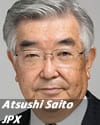The Nikkei index, with a 56% increase in 2013, led the way upward for major indices, but the Japan Exchange Group (JPX), which formally came into being one year ago with the merger of the Tokyo and Osaka exchanges, is still lagging regional competition in certain criteria.
It has a threefold plan, to boost its presence in derivatives, to improve market corporate governance and to increase IPOs, according to JPX CEO Atsushi Saito.
“Competition between exchanges is not something that is reported that often in the Japanese media, but nearly every day there is something happening in that area,” said Saito, speaking at Tokyo’s Foreign Correspondents’ Club of Japan.
In cash equities, JPX is ranked third globally in terms of both capitalization and trading volumes, behind the New York Stock Exchange (NYSE) and NASDAQ, and has 3,400 companies listed: the largest number of any exchange.
“In contrast, the JPX derivatives market trading volume ranks 14th in the world, and comes in only 7th even in Asia,” said Saito, noting that the world’s major exchanges are switching their focus to derivatives markets.
He pointed out that NYSE, with a 220-year history, was recently bought by a derivatives exchange company with a history of 15 years.
JPX is now going to work to strengthen its derivatives offerings and will also move into the commodities sector.
New listings
The Japanese government is working to encourage more businesses of interest to venture capital investors, while JPX also will attempt to help entrepreneurship through an increase in IPOs, said Saito.
There were 58 IPOs in Tokyo in 2013, which while it continues the uptrend since bottoming out in 2009, is still low for a market of its size. Sixty percent of those that did list opened at more than double their offer price.
Tokyo will also see its first foreign IPO next month since Citigroup in 2007, albeit a relatively small biotech venture.
Acknowledging a lack of foreign listings, Saito said the exchange maintained relatively strict listing criteria, citing examples of foreign firms in the past that had behaved fraudulently, including a company from a nearby country that had disappeared along with investors’ money. Dual listings with foreign exchanges were JPX’s preference, he concluded.
Corporate governance
Japan’s corporate governance has come in for criticism from foreign investors, but the exchange insists progress is gradually being made in this area, particularly with regard to external directors.
The exchange has revised listing rules to require companies to appoint at least one outside director. The percentage of companies with outside directors is increasing every year, and is up to about 62.3%, but quite a few only appoint one lone outside director.
In November last year, the Japanese cabinet agreed on an amendment to the Companies Act that, while stopping short of forcing listed companies to appoint outside directors, will require them to explain in their annual reports and at shareholders meetings why they haven’t done so.
New indices
The exchange believes JPX Nikkei Index 400 (introduced in January 2014), which incorporates return on equity (ROE) and corporate profitability criterion, is another step in the right direction.
The index, developed to appeal to global investors, is the “first in the world to be based on fundamentals,” according to Saito, who acknowledged that ROE in Japan, at 5 to 7%, is still low compared to global standards.
HFT
High-frequency traders are apparently still welcome in Tokyo, although the exchange says it will continue to regulate trading as it deems necessary.
“Japan was criticised for being a controlled or not an unfettered, capitalistic market. But very ironically, after the series of scandals related to machine trading, even the US’ SEC approached us asking how Tokyo maintained an orderly market even with high-speed trading,” said Saito.
“We have very precise regulations on pricing in the market. We learned from the history of rice trading in Osaka in the 1700s. Most of our prices are auctions, which work on perfect matching. This is very different to the US and Europe where the gates open and buy and sell orders just flood in; their volatility is much higher.”
